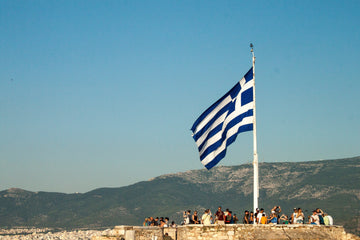In This Article:
Greek Mythology Travel: A Journey Through Ancient Legends
Imagine yourself stepping into the world of ancient Greece, where myths and legends come alive. Greek mythology is not just a collection of stories; it's a rich tapestry that weaves together history, culture, and spirituality. One of the most fascinating aspects of Greek mythology is its connection to travel. From the mythical landscapes of Mount Olympus to the bustling city-states of Athens and Sparta, every place holds a story waiting to be discovered.

Mount Olympus: The Abode of the Gods
Mount Olympus, the highest peak in Greece, is said to be the home of the gods. According to myth, Zeus and his fellow Olympian deities resided here, overlooking the mortal world. Today, visitors can hike to the summit, where they can feel the divine energy that once inspired poets and philosophers. The journey is not just physical but also spiritual, as you step into a world where the boundaries between reality and myth blur.
Delphi: The Oracle’s Whisper
In the heart of mainland Greece lies Delphi, once considered the center of the world by ancient Greeks. Pilgrims from all over the Mediterranean traveled here to seek guidance from the Oracle of Apollo. Today, the ruins of the Temple of Apollo, the grand amphitheater, and the treasuries still stand, offering a glimpse into the mystical past. Walking through Delphi, one can almost hear the whispers of prophecies carried by the mountain breeze.

The Peloponnese: Birthplace of Dionysus
The Peloponnese, a region in southern Greece, is where the god of wine, Dionysus, was born. According to legend, Dionysus was raised by nymphs on the island of Naxos and later traveled throughout Greece, teaching mortals the art of winemaking. Today, visitors can explore the ancient ruins of Mycenae and Tiryns, which were once part of the kingdom of Mycenae, where Dionysus was said to have spent his early years.

Crete: The Labyrinth of Legends
The island of Crete holds one of the most thrilling myths of all—King Minos, the Minotaur, and the labyrinth. The Palace of Knossos, an archaeological wonder, is said to be the site of the labyrinth built by Daedalus to imprison the fearsome Minotaur. Wandering through its intricate ruins, visitors can imagine the pulse of ancient Minoan civilization and the heroic tale of Theseus unraveling before their eyes.

Cape Sounion: Poseidon’s Sunset
Standing on the edge of the Aegean Sea, the Temple of Poseidon at Cape Sounion is a breathtaking sight, especially at sunset. Dedicated to the god of the sea, this temple was a vital landmark for ancient sailors navigating the waters. Legend has it that King Aegeus leaped to his death from these cliffs, giving the Aegean Sea its name. Today, travelers can watch the sun dip below the horizon, just as countless ancient mariners did before embarking on their mythic journeys.

Wine in Greek Mythology: The Legacy of Dionysus
Wine has been an integral part of Greek culture since ancient times, and its history is deeply intertwined with mythology. The god Dionysus, also known as Bacchus in Roman mythology, is the patron deity of wine and revelry. His story is a fascinating blend of myth and reality, reflecting the cultural significance of wine in ancient Greece.
The Birth of Wine
According to myth, Dionysus was born on the island of Naxos and was raised by nymphs. He later traveled throughout Greece, teaching mortals how to cultivate grapevines and produce wine. This myth highlights the importance of wine as a gift from the gods, meant to bring joy and celebration to humanity.

Assyrtiko
Wine from Greece, a white Greek wine grape indigenous to the island of Santorini
The Festival of Dionysus
In ancient Greece, the Festival of Dionysus was a grand celebration that honored the god of wine. It involved music, dance, theater performances, and feasting. Dionysus festival is not just a social event but also a way to connect with the divine. Today, modern interpretations of this festival can be seen in various cultural events and wine festivals around Greece.

Wine from Ikaria, Greece
Ikaria, a picturesque Greek island in the Aegean Sea, is renowned for its unique, age-old winemaking traditions that contribute to the locals' legendary longevity. Ikaria's nutrient-rich, well-drained soil and warm Mediterranean climate create ideal conditions for growing high-quality grapes. The island's strong Aegean winds and traditional farming methods further enhance the flavor and resilience of its indigenous grape varieties. Therefore, the island is one of the best grape-growing places in the world.
In addition, the island’s wines, often made from indigenous grape varieties like Fokiano and Begleri, are naturally fermented and crafted with minimal intervention, reflecting the island’s unspoiled terroir. With its deep connection to Dionysian traditions, Ikaria’s wine culture offers a taste of ancient Greece in every sip.

Innovation and Art
The legacy of Dionysus, the god of wine, revelry, and theater, continues to inspire creativity in modern times. From theatrical performances to innovative wine-making techniques, his myth serves as a muse for contemporary artists and entrepreneurs. Festivals celebrating his influence can be found across Greece, where traditional storytelling blends with cutting-edge artistic expression. The Dionysian spirit lives on in modern theater productions, immersive art experiences, and the fusion of ancient winemaking practices with modern technology.
Greek Vintage Sunglasses
MYTH Greece: Sunglasses Inspired by the Gods

Just as mythology continues to shape Greece’s cultural identity, it also inspires modern design. MYTH Greece, a brand dedicated to crafting luxury sunglasses, blends ancient aesthetics with contemporary fashion. Drawing inspiration from the gods and heroes of Greek legends, their designs reflect the power, elegance, and timeless beauty of mythology. Whether channeling the boldness of HEPHAESTUS or the grace of DIANA, MYTH Greece sunglasses bring a touch of divine style to the modern world.















